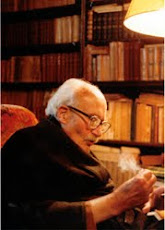Den colombianske författaren Nicolás Gómez Dávila (1913–1994) fångade i sina många aforismer en reaktionär syn på världen och livet, skild både från den moderna vänstern och den moderna ”högern”. Man kan i hans aforismer identifiera en klassiskt konservativ skepsis till den moderna stat som ersatt samhället, liksom en psykologisk analys av moderna fenomen som revolutionär ”vänster” med influenser från Nietzsche.
Intressant och inspirerande är också Dávilas beskrivning av den autentiske reaktionären. Beskrivningen är besläktad både med konservativ revolution och kreativ konservatism å ena sidan och Evolas apoliteia och Jüngers anark å den andra (där finns också släktskap med Savitri Devis ”men above time”).
En reaktionär syn på historien
The reactionary is not a nostalgic dreamer of a canceled past, but rather a hunter of sacred shades upon the eternal hills.
– don Colacho
don Colacho vänder sig mot den gängse synen på historien, en syn präglad av den marxska historiematerialismen. Den progressiva synen på historien innebär att den genomsyras av ett förnuft, och att den har ett mål (exempelvis det klasslösa eller det mångkulturella samhället eller ”frihet”). Genom att liera sig med detta förnuft, vilket ersätter Gud, ger den progressive mening åt sitt liv.
För den reaktionäre har historien ingen sådan mening. Istället är det en dialektisk process:
History is a necessity that freedom produces and chance destroys.
don Colacho skiljer sig dock även från den konservativa synen på det förflutna, och här är släktskapet med Evola och traditionalismen tydligt. För den progressive är det nya av godo och för den konservative är det gamla av värde, men reaktionären är inte identisk med den konservative:
If the progressive casts himself into the future, and the conservative into the past, the reactionary does not measure his anxieties with the history of yesterday or with the history of tomorrow.
Today’s conservatives are nothing more than liberals who have been ill-treated by democracy.
Reaktionären har egna måttstockar. don Colacho skriver:
The reactionary does not aspire to turn back, but rather to change direction. The past that he admires is not a goal but an exemplification of his dreams.
Likheten med den nya högerns sfäriska syn på historien är uppenbar, om man bortser från don Colachos starka inslag av pessimism.
I do not belong to a world that is passing away. I prolong and transmit a truth that does not die.
Tradition is a work of the spirit which, in turn, is a work of the tradition. When a tradition perishes the spirit is extinguished, and the presentations it shaped into objects revert to their condition as instruments.
The reactionary escapes the slavery of history because he pursues in the human wilderness the trace of divine footsteps.
Pessimism och defaitism
We reactionaries provide idiots the pleasure of feeling like daring avant-garde thinkers.
– don Colacho
Denna anknytning till tidlösa värden ihop med förståelsen av historien leder hos don Colacho naturligt till en betydande pessimism. Det finns enligt honom sätt att bedriva politik som förstör både själen och det mål man kämpar för, ett synsätt han delar med den klassiska anarkismen. Det politiska våldet lämnar efter sig fler ruttnande själar än lik, demokrati betraktar han som en del av problemet (en autentisk reaktionär kan varken vinna massorna genom förenklad demagogi eller genom att muta dem med andra människors pengar). Detta uttrycks i flera aforismer.
The reactionary longs to convince the majorities, the democrat to bribe them with the promise of other peoples goods.
The surest ways of winning are more disastrous than any defeat.
Not all defeated men are decent, but all decent men end up defeated.
The inferior man is always right in an argument, because the superior man has condescended to argue.
Rather than against the masses that insult them, we must defend our truths against the defenders that bring them down to the masses’ level.
Detta leder hos don Colacho naturligt vidare till ett fokus på det egna livet, likheterna med Jüngers anark och Evolas apoliteia är här tydliga. Men samtidigt finns det en aspekt man lätt missar, en aspekt där det klassiska arvets metapolitik betonas. don Colacho skriver:
Art is the most dangerous reactionary ferment in a democratic, industrial, and progressive society.
Sann konst är per definition reaktionär, och därmed ett hot mot det moderna samhället. Den genuine konstnären kan därför samtidigt vara anark och subversiv.
Writing is the only way to distance oneself from the century in which it was one’s lot to be born.
Att leva som reaktionär
To age with dignity is the task of every moment.
– don Colacho
Genom ett visst sätt att leva vårdar reaktionären samtidigt sin egen själ och för vidare en tradition, representerar ett föredöme. I centrum för detta står omsorgen om den egna själen. I likhet med Nietzsche varnar don Colacho för ressentiment:
A soul is noble not when nothing injures it, but when it heals quickly.
Omsorgen om själen nödvändiggör också en viss distans till samtiden:
A cultured soul is one in which the din of the living does not drown out the music of the dead.
The majority of properly modern customs would be crimes in an authentically civilized society.
Intressant är den skepsis mot den moderna intelligentsian och boklig lärdom don Colacho delar med många historiska reaktionärer. Evola citerade här en piedmontsk aristokrat som uttryckte det hela med orden:
I divide our world into two classes: the nobility and those who have a university degree.
Mot den akademiska världens fokus ställer don Colacho erfarenheter, därmed höjer han tillsynes paradoxalt nog även värdet på de ”obildade” klassernas åsikter i en till namnet demokratisk men bildningsfokuserad tidsera:
The so-called prejudices of the upper classes tend to consist of accumulated experiences.
My convictions are the same as those of an old woman praying in the corner of a church.

Intressant är också hans syn, fjärran från både marxism och socialdarwinism, på hur reaktionären behandlar sina underordnade:
Treating an inferior with respect and affection is the classic syndrome of the reactionary psychosis.
Man kan också identifiera en livssyn som är, i likhet med Evolas, anti-Bourgeois, även om fokus hos bibliofilen Davila skiljer sig något från den mer äventyrlige Evolas:
The reactionary does not condemn the bourgeois mentality, but rather its predominance. What we reactionaries deplore is the absorption of the aristocracy and the people by the bourgeoisie. It is the emasculation of liberty or, alternatively, of equality.
The communist hates capitalism with the Oedipus complex. The reactionary views it only with xenophobia.
Genomgående finns också ett fokus på att förbättra sig själv och vårda sitt inre liv:
An aristocratic society is one where the desire for personal perfection is the animating spirit of the social institutions.
The true aristocrat is the man who has an interior life. Whatever his origin, his rank, or his fortune.
Sammantaget är don Colachos aforismer värdefulla som råd för den som vill vårda sin normalitet i en abnorm tidsera.
Even the farthest right of any right always seems too far to the left for me.
Being a reactionary is not about believing in certain solutions, but about having an acute sense of the complexity of the problems.
The reactionary does not become a conservative except in ages which maintain something worthy of being conserved.
The reactionary does not argue against the world in the hope of defeating it, but so that therights of the soul do not prescribe.
The reactionary is not upset by certain things, but by anything out of place.
Mer don Colacho
The Authentic Reactionary
Reaktionära aforismer – åter till don Colacho











